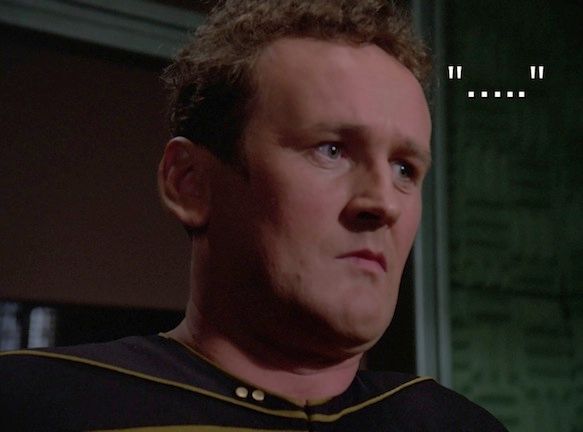
Memory Alpha Entry
Chrissie's Transcript
SFDebris' Review
After Melinda Snodgrass' hugely successful episode "The Measure of a Man", writing another episode for The Next Generation was all but certain. Enter "Up The Long Ladder", a story that had a promising concept that brought real world issues into the Star Trek universe that unfortunately crashes and burns thanks to two mistakes.
- The Mary Sue in this episode is a lot more obvious and adds nothing to the story.
- Melinda pitched her story to our good friend Maurice Hurley.
But I can forgive that if it wasn't for her second mistake that turned this episode into an almost unwatchable mess that it is now. She tried to pitch it to Maurice Hurley in a way that it would make it look more appealing to him. When she gave an analogy on what this culture of primitives was like, she used the phrase "Irish Tinkerers" since Maurice was an Irishman himself. Well, Maurice loved the idea so much that he practically ordered Melinda to write these inhabitants as literal Irish Tinkerers, complete with Irish accents, barrels, stacks of hey, and even farm animals like chickens and pigs. This feels less like a 22nd century human colonization and more like some literal human Irish group from the 19th century just somehow found a way onto a far away world and didn't make any kind of technological progression. And even if they literally were that, they would still be depicted as less stereo typical than what we got here.
And if that wasn't bad enough, this episode begins with with the most random, non-set up and no pay off teaser I think I've ever seen in a Star Trek episode. Worf simply collapses. Will this have anything to do with the story later on? No. It just happens.
The other colony in this episode comes in the form of a much more technologically advanced culture who continue to exist simply by cloning themselves. This culture tricks Riker and Pulaski into coming down on their planet where they conveniently knock them out, take samples from their bodies and erase their memories of this happening. You know an episode is bad when we go from Irish Stereotypes that are there solely for comic relief, to a society of clones who attack and violate our heroes. And it gets worse. When Riker and Pulaski learn about what happened to them, they discover the cloning area where their clones are almost ready to start living their newly formed lives. Riker and Pulaski give an understanding look to one another and decide to kill the clones in their sleep. No debate, no moral discussion, nothing. While these clones are a result of Riker and Pulaski being violated, this by no means comes off as an act of Justice. It feels more like what Game of Thrones characters would do to a King's bast*** child.
And how does our episode conclude? By having the cloning colony mate with the Irish colony. This sounds less like a solution and more like a dictator telling his civilians how to procreate. Our heroes are literally telling these two civilizations that their unique cultures are irrelevant and that, as SFDebris put it, "You are mules for DNA and nothing more". I could go on, but you really need to check out SFDebris' review. He words it better than I ever could, and he brings up a moment in a Season 3 episode that completely opposes everything that Picard does here.
CONCLUSION: This is a bad episode. Not that the idea isn't good, but the way idea plays out and how our heroes resolve it is so poorly done that you have to wonder why the Prime Directive even exists if our heroes are not going to look at the moral ramifications of it. Sure, law wise it wouldn't apply, but what about the reasoning behind it? Our heroes are literally interfering with two cultures and making them change their ways because they believe it will save them in the long run. Not three episodes ago, they were honestly close to letting an entire species die out on a planet even if their interference wouldn't have been known. This episode is nothing but bad taste in moral dilemmas.
STINGER:

Last edited:

